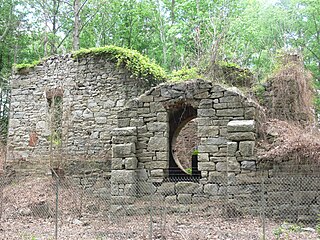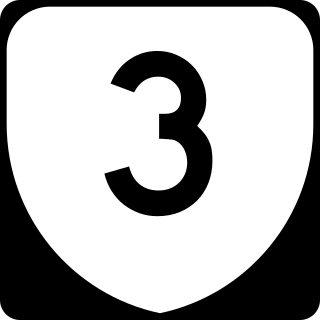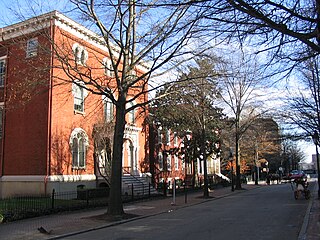
John Wilkes Booth was an American stage actor who assassinated United States President Abraham Lincoln at Ford's Theatre in Washington, D.C., on April 14, 1865. A member of the prominent 19th-century Booth theatrical family from Maryland, he was a noted actor who was also a Confederate sympathizer; denouncing President Lincoln, he lamented the then-recent abolition of slavery in the United States.

Richmond County is a county located on the Northern Neck in the U.S. state of Virginia. As of the 2020 census, the population sits at 8,923. Its county seat is Warsaw. The rural county should not be confused with the large city and state capital Richmond, Virginia. It was formed in 1692 when the first Rappahannock County was divided to form Richmond County and Essex County.

Mathews County is a county located in the U.S. state of Virginia. As of the 2020 census, the population was 8,533. Its county seat is Mathews.

Goochland County is a county located in the Piedmont of the Commonwealth of Virginia. Its southern border is formed by the James River. As of the 2020 census, the population was 24,727. Its county seat is Goochland.

Caroline County is a United States county located in the eastern part of the Commonwealth of Virginia. The northern boundary of the county borders on the Rappahannock River, notably at the historic town of Port Royal. The Caroline county seat is Bowling Green.

Midlothian is an unincorporated area and Census-designated place in Chesterfield County, Virginia, U.S. Settled as a coal town, Midlothian village experienced suburbanization effects and is now part of the western suburbs of Richmond, Virginia south of the James River in the Greater Richmond Region. Because of its unincorporated status, Midlothian has no formal government, and the name is used to represent the original small Village of Midlothian and a vast expanse of Chesterfield County in the northwest portion of Southside Richmond served by the Midlothian post office.

Thomas Lincoln was an American farmer, carpenter, and father of the 16th president of the United States, Abraham Lincoln. Unlike some of his ancestors, Thomas could not write. He struggled to make a successful living for his family and faced difficult challenges in Kentucky real estate boundary and title disputes, the early death of his first wife, and the integration of his second wife's family into his own family, before making his final home in Illinois.

The Bermuda Hundred campaign was a series of battles fought at the town of Bermuda Hundred, outside Richmond, Virginia, during May 1864 in the American Civil War. Union Maj. Gen. Benjamin Butler, commanding the Army of the James, threatened Richmond from the east but was stopped by forces under Confederate Gen. P.G.T. Beauregard.

John Brown Baldwin was a Virginia lawyer and Democratic politician, who served one term in Virginia House of Delegates before the Virginia Secession Convention of 1861, during which he was a Unionist. During the American Civil War, Baldwin believed his primary loyalty was to his state, and served as one of Virginia's representatives to the First and Second Confederate Congresses. He became one of the leading critics of President Jefferson Davis, who was seen by many as usurping the Confederacy's states' rights principles. During Congressional Reconstruction, Baldwin became Speaker of the Virginia House of Delegates.
Norge is an unincorporated community in James City County, Virginia, United States.

Virginia State Route 3 is a primary state highway in the U.S. state of Virginia that extends from the town of Culpeper south and eastwardly to Gloucester in Virginia's Middle Peninsula region. For many years, a portion was named "Historyland Highway".

Abraham Bedford Venable was a Virginia lawyer, planter and politician who served in the U.S. House of Representatives and briefly as U.S. Senator, as well as in the Virginia House of Delegates.

Thomas Nelson Conrad was the third president of Virginia Tech and served in the Confederate Secret Service during the Civil War.
Triune is an unincorporated community in eastern Williamson County, Tennessee, approximately halfway between Franklin and Murfreesboro. The community is located along the Wilson Branch of the Harpeth River. The intersection of former local roads State Route 96 and the concurrency of U.S. Routes 31A and 41A is here. The community is located just north of these roads interchange with Interstate 840.
Joseph Hanks (1725–1793) was the great-grandfather of United States President Abraham Lincoln. It is generally accepted that Joseph was the father of Lucy Hanks, the mother of Nancy Hanks Lincoln. There is also a theory that Joseph and his wife, Ann ("Nannie"), had a son named James who married Lucy Shipley, sired Nancy Hanks, but died before Lucy and Nancy came to Kentucky.

Farnham Church is a historic Episcopal church located at Farnham, Richmond County, Virginia. It was built in 1737, and is a one-story, cruciform shaped brick Colonial era church building. It measures 63 feet, 8 inches, feet by 58 feet, 2 inches, and is topped by a gable roof. Two years into the War of 1812, bullet holes were left in the walls during a conflict between the Virginia militia and the British fleet, led by Admiral George Cockburn. This event was called the Skirmish at Farnham Church. During the Civil War the church was used by Union soldiers as a stable. The church was last renovated in 1921 in the Georgian Revival style.
The Civil War Trust's Civil War Discovery Trail is a heritage tourism program that links more than 600 U.S. Civil War sites in more than 30 states. The program is one of the White House Millennium Council's sixteen flagship National Millennium Trails. Sites on the trail include battlefields, museums, historic sites, forts and cemeteries.
Ebenezer Erskine Mason was a farmer who also served as a local magistrate and one of Fairfax County, Virginia's two delegates to the Wheeling Convention in 1861 which created the Restored Government of Virginia and led to the creation of the state of West Virginia.















